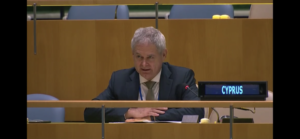Item 75 “Report of the International Criminal Court”
United Nations, 2 November 2020
Mr. President,
My remarks today are complementary to the statement delivered by the European Union, as well as to the statement of the States Parties to the Rome Statute delivered by Germany.
I would like to thank President Eboe-Osuji for the introduction of the Report of the Court, and to express our appreciation and recognition for the Court’s important progress in its investigative, prosecutorial, and judicial activities during the reporting period, despite the practical challenges caused by the COVID-19 pandemic, at a time when the Court was seized of more than 10 cases at different stages of proceedings. We would also like to welcome the final Report of the Independent Expert Review, which is an important development and a significant step at enhancing the performance and effectiveness of the ICC.
The very existence of international criminal justice is predicated on the urgent need to eradicate impunity for perpetrators of the most serious crimes of concern to the international community. As we celebrate the 75th anniversary of the United Nations, we should recall the first international criminal tribunals at Nuremberg and Tokyo, seven decades ago, that laid the groundwork for modern international criminal law and for the international legal order we have today, as well as for the notion of supra-national criminal justice. Twenty-two years after the establishment of the Rome Statute of the ICC, the Court has established itself as a mature institution and, with 123 states parties from all around the globe, it represents today the organized international community’s stance against impunity for genocide, crimes against humanity, war crimes and the crime of aggression. Furthermore, under the Rome Statute, a referral by the UN Security Council to the Court remains the best means of ensuring accountability for persons accused of the gravest crimes.
Cyprus has always been a strong supporter of the Court and we have been striving along with other states parties to consolidate it as an independent and impartial judicial institution of the highest quality. We add our voice to that of the Member States who have expressed today their commitment in defending and preserving the integrity of the Rome Statute undeterred by any measures or threats against the Court, its officials and those cooperating with it. Despite the persistent external challenges that the ICC has faced, the Court remains a mechanism of great value to humanity, since it is the only permanent international judicial institution that ensures criminal accountability for individuals and can deliver justice to the victims of the most serious crimes, when all other venues fail. We should, however, also recall that the Court unavoidably depends on the states themselves for the implementation of its functions, including the arrest and surrender of suspects, and we need all of us to always assume our own responsibilities and assist the Court to the best of our ability. We further stress the importance of steadily enhancing the invaluable relationship between the ICC and the UN, based on their Relationship Agreement and their mutually reinforcing mandates. The effective cooperation between the two organizations is critical for the ability of the Court to fulfil its functions.
This is an important year for the Court for the additional reason that six new judges and the Court’s new Prosecutor will be elected at the nineteenth session of the Assembly of State Parties. We welcome the efforts and achievements of the Court so far, and we acknowledge that coping with the challenges ahead requires hard work and sustained effort. If we genuinely believe that international criminal justice and the promotion of the rule of law at the international level is an attainable goal, all state parties, as well as the broader international community, must do their part to support the Court to fulfil its mandate, including through the United Nations.